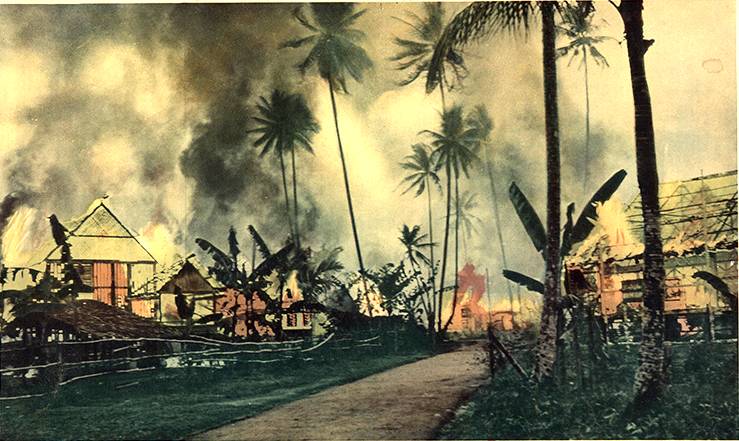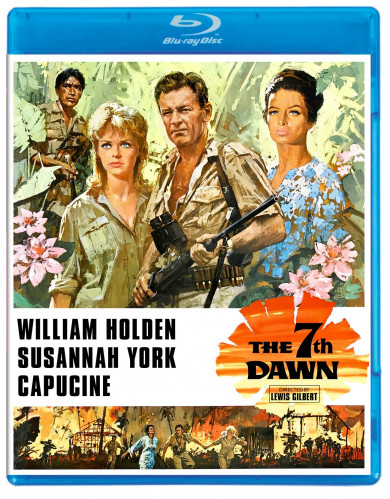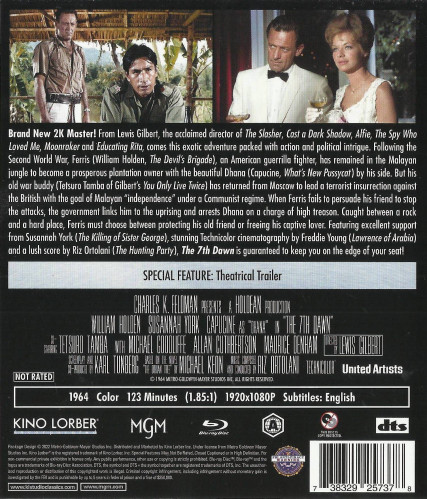THE 7th DAWN [1964 / 2022] [Kino Lorber Studio Classics] [Blu-ray] [USA Release] THE 7th DAWN is a Suspenseful, Provocative and Ultimately Illuminating Film!
From Lewis Gilbert, the acclaimed director of films ‘The Slasher,’ ‘Cast a Dark Shadow,’ ‘Alfie, The Spy Who Loved Me,’ ‘Moonraker’ and ‘Educating Rita,’ comes this exotic adventure packed with action and political intrigue. Following the Second World War, Major Ferris [William Holden], an American guerrilla fighter, has remained in the Malayan jungle to become a prosperous plantation owner with the beautiful Dhana Mercier [Capucine] by his side. But his old war buddy Ng [Tetsurô Tanba] has returned from Moscow to lead a terrorist insurrection against the British with the goal of Malayan “independence” under a Communist regime. When Ferris fails to persuade his friend to stop the attacks, the government links him to the uprising and arrests Dhana Mercier on a charge of high treason. Caught between a rock and a hard place, Major Ferris must choose between protecting his old friend or freeing his captive lover. Featuring excellent support from Susannah York, stunning Technicolor cinematography by Freddie Young (‘Lawrence of Arabia’) and a lush film score by Riz Ortolani (‘The Hunting Party’), ‘THE 7th DAWN’ is guaranteed to keep you on the edge of your seat!
FILM FACT: The novel “The Durian Tree” was published in 1960. It was written by Australian journalist Michael Keon and the lead character Ferris was an Australian. The New York Times called it “a serious and ambitious novel” but said Keon was "a good reporter but a poor novelist." Film rights were bought by Charles K. Feldman. There was a nude scene in the script to be performed by Susannah York, who did not want to do it. However, on location the filmmakers insisted she do it. Susannah York did one take and her stand-in did another. Photos taken of Susannah York doing the scene were later published in Playboy magazine. “Someone had a long distance camera,” Susannah York explained. "I'd just like to forget about it. It's an unfortunate business.” The film generated US$2.3 million in revenue being 89th ranked in the films of 1964. The film's score was composed by Riz Ortolani following the popularity of his score for ‘Mondo Cane’ that was released in the USA in 1963. The theme song The Seventh Dawn was sung by The Lettermen on the movie soundtrack. Their version can be reviewed on YouTube. Sergio Franchi recorded the song on a 1964 single RCA 47-8409 and Roland Shaw provided an instrumental cover version.
Cast: William Holden, Susannah York, Capucine, Tetsurô Tanba, Michael Goodliffe, Allan Cuthbertson, Sydney Tafler, Maurice Denham, Beulah Quo, Christopher Allen (uncredited), Griffiths Alun (uncredited), Kip Bahadun (uncredited), Ibrahim Bin (uncredited), Tony Cheng (uncredited), Noel Chow (uncredited), Hew Thian Choy (uncredited), Yap Mook Fui (uncredited), David Keith (uncredited), R. William Koh (uncredited), James Massong (uncredited), Tony Price (uncredited), Hugh Robinson (uncredited), Seow (uncredited), David Weinman (uncredited) and George Zakhariah (uncredited)
Director: Lewis Gilbert
Producers: Charles K. Feldman (uncredited), John Dark and Karl Tunberg
Screenplay: Michael Keon (novel) and Karl Tunberg (screenplay)
Composer: Riz Ortolani
Costume and Wardrobe Department: Betty Adamson (wardrobe supervisor), Charles Guerin (wardrobe) (uncredited) and Hylda Gilbert (costumes)
Cinematography: Freddie Young O.B.E., B.S.C. (Director of Photography)
Image Resolution: 1080p (Technicolor)
Aspect Ratio: 1.85:1
Audio: English: 2.0 DTS-HD Master Audio
Subtitles: English
Running Time: 123 minutes
Region: Region A/1
Studio: UNITED ARTISTS / Kino Lorber Studio Classics
Andrew’s Blu-ray Review: ‘THE 7th DAWN’ [1964] is an action-adventure picture, with a solid piece of work that features an exotic location that was filmed in Malaysia, a couple of big stars that includes William Holden and Capucine who is a fairly “new” actress and the British actress Susannah York to add to the cast list, and, for the year it was released and its budget limitations, moderately spectacular action sequences. Before the films starts, Kino Lorber Studio Classics wish to say our deep appreciation to the People and Government of Malaysia for their help in making of the film ‘THE 7th DAWN.’
‘THE 7th DAWN’ is based on the 1960 novel, “The Durian Tree” by author Michael Keon, and was adapted to film by Karl Tunberg. It’s the story of the path to Malayan independence from British rule after World War II, especially during the chaotic and violent years of the early 1950’s.
Amid the tropical beauty and the local colour, ‘THE 7th DAWN’ serves up exciting action and relatable romance, letting disturbing political complications provide extra conflict. For a Cold War film the politics are halfway benign: a decent nationalist movement is welcomed by an English governor, but Communist terrorism makes peaceful progress impossible. The harsh English reaction does not help at all. This show came out in 1964, when strife in Southeast Asia could still serve as a backdrop for “escapist” entertainment. A year later, the divisive and controversial Vietnam War would push the entire subject out of bounds.
Major Ferris [William Holden] and his relationship with Dhana Mercier [Capucine] is complicated by the arrival of Governor Trumphey [Michael Goodliffe] and his young daughter Candace Trumpey [Susannah York], who rather boldly sets out to entice and seduce the older planter. Ferris and Candace are present when a terrorist throws a grenade into the Governor’s party. Trumphey forgets Dhana Mercier’s peaceful negotiations. Hitting back hard, he orders his security specialist Cavendish [Allan Cuthbertson] to burn down a local village suspected of hiding rebel arms.
The major conflict involves all of the principals: Dhana Mercier is arrested when grenades are discovered in her possession. Trumphey’s court decides that it must sentence her to hang even though it’s assumed that Dhana Mercier’s been framed and that killing her will turn the populace against the British. Major Ferris goes back into the jungle to find Ng. But the headstrong Candace Trumpey makes a totally unexpected move: inspired by Dhana Mercier’s courage, she offers herself to the Reds, to serve as a hostage for an exchange. Ng [Tetsurô Tanba] welcomes the extra leverage: Ng knows the English will not relent but doesn’t mind if both women die, because it will serve as a stimulant for his revolution. Can one man alone, Major Ferris and find Ng and stop this insanity?
It’s all fairly exciting stuff, and it’s a colourful display of mid-1960’s Hollywood production values depicting warfare in a jungle setting. William Holden is fine as the stalwart and stubborn former mercenary turned businessman. Capucine, although lacking Asian heritage, is convincing enough as being half Malayan with her skin colour appears to have been artificially darkened, as well as Tetsurô Tanba exhibits the same skin tone, and why director Lewis Gilbert likely chose him to play Tiger Tanaka in the film ‘You Only Live Twice.’ Susannah York is also a screen presence who, being the only blonde in sight, attracts audience attention. Susannah York had just come off her appearance in the award-winning film ‘Tom Jones,’ so her status was a quickly rising star.
A big plus is the direction of Lewis Gilbert, who at this time had a number of fine shows to his name (Carve Her Name with Pride, Sink the Bismarck!). His greatest was yet to come, Alfie. Gilbert’s dramatic scenes are fine, even if the character foundations are shaky. William Holden is an older version of his character from the film ‘Bridge on the River Kwai.’ Ferris thinks his combat comradeship with Ng is like an insurance policy: we’re pals; therefore I can bypass the social upheaval and grow rich from your country’s natural resources.
The musical score by Riz Ortolani is noted with lush melodies and sweeping strings. The theme song, sung by The Lettermen, became a hit standard in the decade.
Few post-Colonial war movies about conflict in countries newly liberated from the Japanese express the situation clearly. The colonials fought and suffered for the Allied side with promises of self-rule after the victory, the fulfilment of which came far too slowly. England acknowledged that they’d step aside but balked on giving a timetable. When France moved right back into Indochina (Vietnam) and held firm, the entire region became ripe for a wave of Communism that had been ripening for thirty years.
THE 7th DAWN MUSIC TRACK LIST
THE SEVENTH DAWN (Music by Riz Ortolani) (Lyrics by Paul Francis Webster) [Performed by The Lettermen]
* * * * *
Blu-ray Image Quality – UNITED ARTISTS and Kino Lorber Studio Classics presents the film ‘THE 7th DAWN’ that was shot by Freddie Young on 35 mm film using spherical lenses, framed at 1.85:1 for its theatrical release. Kino Lorber Studio Classics’s Blu-ray version is framed as an aspect ratio 1.66:1, which works well, though the packaging incorrectly lists it as being 1.85:1. Kino Lorber Studio Classics describes it as being a “brand new 2K master,” and while there’s no information regarding the elements that were used, the source appears to be an interpositive. It’s reasonably detailed, with prominent but even grain, and only light damage such as occasional white speckling. There are abundant optical dissolves for scene transitions, but those were cut into the film, so the leading and trailing shots aren’t affected by the generational loss. The Technicolor balance looks natural, with good contrast and deep black levels and Freddie Jones’ cinematography captures panoramic vistas of Malaysia and its jungles. A few minor flaws aside, this is still a fine transfer of a visually beautiful film. Please Note: Although they say the film was filmed in Technicolor, to me it looked more like Eastmancolor.
Blu-ray Audio Quality – UNITED ARTISTS and Kino Lorber Studio Classics brings us the film ‘THE 7th DAWN’ with just one standard 2.0 DTS-HD Master Audio experience. It is a solid if unremarkable track, generally clean if a bit thin and lacking in bass, but with clear dialogue. The lush composed film score by Riz Ortolani is slightly hampered a bit by the limited fidelity and lack of bass, but those limitations are inherent to the elements.
* * * * *
Blu-ray Special Features and Extras:
Theatrical Trailers: Here we get to view ten Kino Lorber Studio Classics’ Trailers and they are as follows:
THE 7th DAWN [1964] [1080p] [1.78:1] [2:55]
The Devil's Brigade [1968] [1080p] [2.35:1] [3:47]
The Revengers [1972] [480i] [1.78:1] [2:40]
Breezy [1973] [1080p] [1.78:1] [2:26]
21 Hours At Munich [1976] [1080p] [1.78:1] [2:35]
The Earthling [1980] [1080p] [1.78:1] [3:11]
Freud [1962] [1080p] [1.78:1] [3:22]
Gold [2016] [1080p] [2.35:1] [3:56]
The Silent Partner [1978] [480i] [1.78:1] [1:55]
Loophole [1981] [480i] [1.78:1] [1:27]
Finally, ‘THE 7th DAWN’ seemed a natural for actor William Holden given the spectacular success he also of course had a major part in that part of the world with ‘The Bridge On the River Kwai.’ Unfortunately ‘THE 7th DAWN’ doesn't quite live up to director Sir David Lean classic masterpiece. ‘THE 7th DAWN’ is a sincere attempt to look at the issues confronting Southeast Asia during the 1950’s. There are three people, the American William Holden, and natives Capucine and Tetsurô Tanba have been involved in resistance to the Japanese. William Holden liked the country so much; he's going to settle down as a rubber planter. Capucine is going back to teaching school and agitating for eventual independence from Great Britain. Tetsurô Tanba is going to school himself, as a scholarship awaits him at a university in Moscow. While it would have been nice to get a few more extras such as an audio commentary track, but finally getting the film ‘THE 7th DAWN’ on Blu-ray is practically a special feature of its own. Kino Lorber Studio Classics continues to offer an outstanding slate of neglected films in high definition, and this release is no exception. ‘THE 7th DAWN’ is fine fare for fans of any of the cast members, action-adventure in exotic landscapes, and 1960’s Hollywood sensibility in widescreen Technicolor. The best of this film is an attempt to show the politics of Malaysia after World War II. There are lessons here that apply to our own time, with European powers facing rising anger in developing countries. Here it's the British who are facing horrors from the Malaysians because they own so much of the good land and maintain typical colonial class and monetary power and even though it was no longer an official colony. Highly Recommended!
Andrew C. Miller – Your Ultimate No.1 Film Aficionado
Le Cinema Paradiso
United Kingdom



